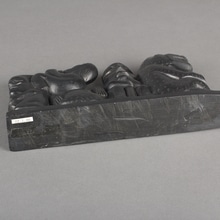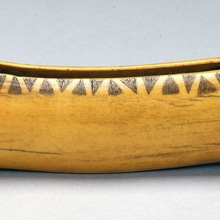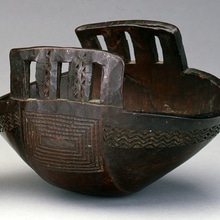
Storage Bags
Portland Art Museum
87.88.95A,B
After the introduction of horses, Plains Indian peoples became much more mobile. Horses allowed them to stay on the move, following the buffalo herds. By necessity, everything families owned had to be portable; they needed a variety of containers to pack belongings when the camp was moved. This p...

Loop Necklace
Portland Art Museum
87.88.93
The Elizabeth Cole Butler Collection.

Robe
Portland Art Museum
87.88.92
The Elizabeth Cole Butler Collection.

Elk Tooth Dress
Portland Art Museum
87.88.90
The Elizabeth Cole Butler Collection.

Carving
Portland Art Museum
87.88.79
The Elizabeth Cole Butler Collection.

Purse
Portland Art Museum
87.88.72
Tribes such as the Yurok of northwestern Califonia and the Klamath of southern Oregon carried on a lively tradition of carving items from both elk antlers and wood. Elk antlers were cut in sections to be fashioned into small containers for dentalia, a marine shell that was used as money by the Yu...

Bowl
Portland Art Museum
87.88.67
Several tribes living along the middle Columbia River, including the Wasco, made bowls and other objects from mountain sheep horns. Pieces of horn were steamed until soft, spread open, and then formed into a shape with raised ends and flaring sides. The bowls are decorated with a combination of c...

Tlakwa (Copper)
Portland Art Museum
87.88.65
Symbolizing great concentrations of wealth and prestige, coppers, or tlakwa, are publicly displayed on ceremonial occasions. Among the Kwakwaka’wakw, these copper plaques are cut or broken and the pieces are distributed to rivals as a means of intimidation through a show of wealth. Visual evidenc...

Staff
Portland Art Museum
87.88.64B
The Elizabeth Cole Butler Collection.

Mask
Portland Art Museum
87.88.63
The Elizabeth Cole Butler Collection.